Posts Tagged ‘Seattle’
Prayer for Syria and Turkey After Devastating Earthquakes
Join World Relief Western Washington in lifting up a prayer for Syria and Turkey. On February 6, 2023, two earthquakes caused enormous destruction. Currently, thousands of people have died and many thousands more are injured or missing. The process of rebuilding homes, businesses, and lives will take many years.
Within our community at World Relief Western Washington, we grieve for those in Turkey and Syria who have lost their lives. Turkey is the world largest refugee hosting country and many of our own participants would have transited through their on their way to the US.
Turkey has sheltered and is currently hosting 3.6 million refugees, most from Syria. Syria, after ten years of rebuilding from destruction caused by war is now forced to rebuild an already crumbling infrastructure in the wake of this devastating earth quake.
We know that many of those impacted were already in vulnerable situations – some are refugees who fled Syria for Turkey while others are persecuted minority groups or those in poverty.
Recovering from this devastation will be very difficult.
As our community grieves, we invite you to join us in prayer for Syria and Turkey. Thank you for joining World Relief Western Washington in asking God to bring an end to suffering and a reign of justice on the earth.
PRAYER FOR SYRIA AND TURKEY
God,
In the face of unspeakable tragedy, the suffering of those in our community, and the destruction and loss of life in Syria and Turkey, we pray what the Psalmist wrote in Psalm 10:
Lord, you know the hopes of the helpless. Surely, you will hear their cries and comfort them. You will bring justice to the orphans and the oppressed.
Comfort the people whose family members and friends have died as a result of these earthquakes. Draw close to them.
Equip believers in Syria and Turkey to show the love of Jesus to their neighbors by helping in tangible ways and sharing the hope of the Gospel.
Inspire generosity in the hearts of people in the United States and across the world, prompting individuals to give the resources and money needed to help communities rebuild.
Empower the Church in America to show radical love for our immediate neighbors who are grieving the loss of life, beauty, and peace in Syria and Turkey.
Let us not turn away, but help us be your hands and feet to love those who are suffering and bear witness to your presence with them.
God, hear our prayer.
Amen.
You Can Help
World Relief is responding to provide immediate assistance through our network of long-standing partners and churches in the region. You can help reach more people in need by responding with us today. Give now to rush help to Turkey and Syria.
Read a press release from World Relief regarding the earthquakes on February 6, 2023.
World Relief Affirms New Biden Administration Proposal Expanding Legal Pathways for Those Fleeing Hardship, Decries New Asylum Restrictions
January 5, 2022
CONTACT:
Pinkston Team
wr@pinkston.co
BALTIMORE — Today, President Biden announced a series of new immigration policies seeking to address the challenges at the U.S.-Mexico border. The Biden administration plans to significantly expand parole programs for individuals from Cuba, Haiti, Nicaragua and Venezuela — allowing individuals with U.S.-based sponsors to lawfully enter the U.S. and be authorized to work upon arrival — while creating new restrictions for individuals from these and other countries who arrive at the U.S.-Mexico border and wish to seek asylum. To do so, the Biden administration is relying upon the legal authority of Title 42, a public health law whose use the administration has previously said is no longer justified, but which the U.S. Supreme Court has kept in effect with a temporary hold issued last month. Under the Title 42 policy, individuals are expelled to Mexico without the ability to seek asylum under the terms of longstanding U.S. immigration law. The administration also announced expansion of refugee resettlement from the Western Hemisphere and additional new proposed restrictions on asylum eligibility.
World Relief welcomes the expansion of lawful mechanisms for entry for individuals from these countries and is eager to partner with local churches to facilitate their integration, but opposes new proposals that would deny due process to those seeking refuge in the United States along the border.
“We strongly denounce any policies imposed by any administration that prohibit, deter, or limit individuals from seeking refuge in the U.S. as allowed by U.S. law,” said Myal Greene, president and CEO of World Relief. “Those fleeing their countries due to conflict, violence or fear not only have the right to seek safety and protection but to plead their case to determine if they qualify to stay in our country lawfully.”
World Relief has persistently advocated for the reversal of the previous administration’s harmful, illegal, and ineffective anti-asylum policies and now calls on President Biden to fulfill his promise to “secure our border, while ensuring the dignity of migrants and upholding their legal right to seek asylum.”
“We certainly acknowledge that not every individual who arrives at the border will qualify to be granted asylum under U.S. law, but we must respect our nation’s moral and legal obligations to ensure due process for those seeking protection from persecution,” said Jenny Yang, vice president for advocacy and policy at World Relief. “We are encouraged by the expansion of legal avenues for those who have fled countries where people are enduring incredible hardship. However, such processes should not be paired with new restrictions on asylum for those with no other avenue for protection under current U.S. law but for reaching the U.S. border to seek asylum. We urge President Biden to work with Congress to develop a pathway forward that both protects our nation’s borders and respects the dignity and value of all human life, especially those who are vulnerable.”
To learn more about World Relief Chicagoland, visit worldrelief.org/chicagoland.
To download a PDF version of this press release, click here.
Liberty and Justice for All
| “I can finally say I am a citizen of a country” Over a week has gone by and many of us have left the celebrations of July 4th behind, just the annual memories of fireworks, grilling out, and a patriotic wave of the American flag to honor of our country’s independence. But for some, like Aimee, “July 4th will always be a day to be remembered.” It is a day of personal freedom – the day she received her US citizenship. Decades back, Aimee’s mother fled the genocide in Rwanda, making it to the Republic of Congo where Aimee was born and raised with her four brothers. It was the only place she had known, but lacked a sense of permanence as they carried the status of “refugee” instead of “citizen.” After 15 years of life in Congo, Aimee and her family finally were approved to resettle in the U.S. in 2013. “When we first moved here, it wasn’t easy to call home. We were always searching for home,” shared Aimee, “moving here was like being born again – having to learn everything – from learning the language to learning the culture. It wasn’t easy for all of us.” Through the uncomfortable and awkward transition of being “born again,” World Relief walked with Aimee and her family, supporting school enrollment, finding housing, and offering English classes. Fast forward a few years, and Aimee has her bachelor’s degree in psychology and works at World Relief Western Washington as an extended case management caseworker; “I wanted to give back for what I received. I want to help refugees when they come here because I can put myself in their shoes.” A dream of hers has been to support displaced people living in refugee camps throughout the world, but citizenship and ease of travel has always been a barrier – until July 4, 2022. Last Monday, after months of studying for the interview and exam, Aimee became a naturalized U.S. citizen – a person with legal permanent resident status, who has made the choice to become a citizen and has fulfilled the requirements established by Congress. |
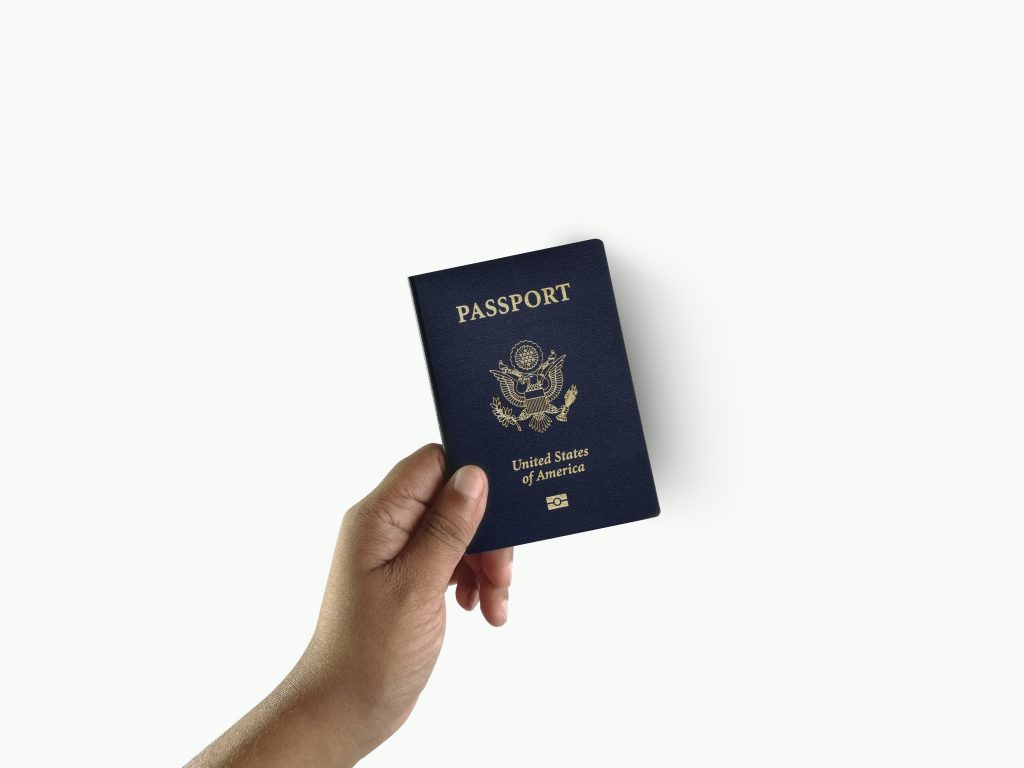
| Becoming a citizen provides more opportunities for things like travel and work; “A passport isn’t just a piece of paper, but it means I can travel to other countries and serve others,” shared Aimee. But citizenship also allows for greater influence stateside, like the right to vote and have a voice in the formation of our communities. Aimee is particularly excited about her newfound suffrage; “I am super excited about being able to vote. I like to advocate for people’s rights but I never got to do it… I never got to express my opinion in that way.” The work of guiding immigrants through the citizenship application process is an act of justice, one our Immigration Legal Services team has been engaging in for decades. We have offered citizenship classes in the past, and now our team manages cases one by one as they offer specialized representation and citizenship application support for qualified individuals. In 2021, our team in King County worked with 826 people from 73 different countries, as they supported different immigration needs, like Aimee’s naturalization process. “I can finally say I am a citizen of a country!” she declared after 24 years without any citizenship. To learn more about the scope of our legal services and how you can best advocate for those pursuing citizenship, visit our website below. |
Liz Meyer Hett is World Relief Western Washington’s Communications Coordinator and serves her local offices with unified branding, content creation, and digital marketing. She has passions for organization, design, and connecting people.
Another Kind of Independence
The string of firecrackers detonated in a profusion of noise, flashes and flying bits of paper—a common enough scene, repeated countless times around the country this past Fourth of July as Americans celebrated their nation’s independence.
What was less common about this particular pyrotechnic display was that the fuse wasn’t lit by an American at all, but by a young Guatemalan mother who had arrived in Bellingham just two weeks prior via the US Refugee Admissions Program.
She beamed as she walked away from the firecrackers, lighter in hand—clearly a fan of loud noises and small explosions. This mother, along with her husband and three young kids, had spent the day celebrating with new friends in a new country, facing a new reality set out before her family. A memorable Independence Day indeed.
The next day, this family showed up at our World Relief office location in Bellingham to pursue a different sort of independence. Joining together with several other refugee families, they came to attend our Family Literacy program in Whatcom County.
Designed to help parents and kids pursue English literacy side-by-side, the Family Literacy Program has already been a great success in King County and we are thrilled to offer a pilot version of the class this summer while we grow our fledgling resettlement program in Whatcom County.
The independence that English literacy offers to families like this may not be as loud and flashy as a string of firecrackers, but its effects will be felt for generations to come.

Steven Shetterly has been managing World Relief’s efforts in opening a resettlement office location in Bellingham (Whatcom County), Washington since 2021. Steven has several years of ESL teaching experience, both in the United States as well as overseas, and has been involved in cross-cultural work in one capacity or another for most of his adult life. Steven has a BA in Spanish and Political Science from Western Washington University, an MA in TESOL from Wheaton College.
A Welcome from Ukraine
I had been to Sea-Tac airport many times before, but this night was different. I was now a World Relief staff member, and for the first time, I was meeting a family resettling in the U.S. after being forced from their home country.
The first step was connecting with Ana, the sister of the arriving family. I crept forward in the stop-and-go traffic, inching toward the arrivals. With each stop, I sent a text, “I’m getting closer.” “Should I bring the booster seats in or can I meet at your car?”
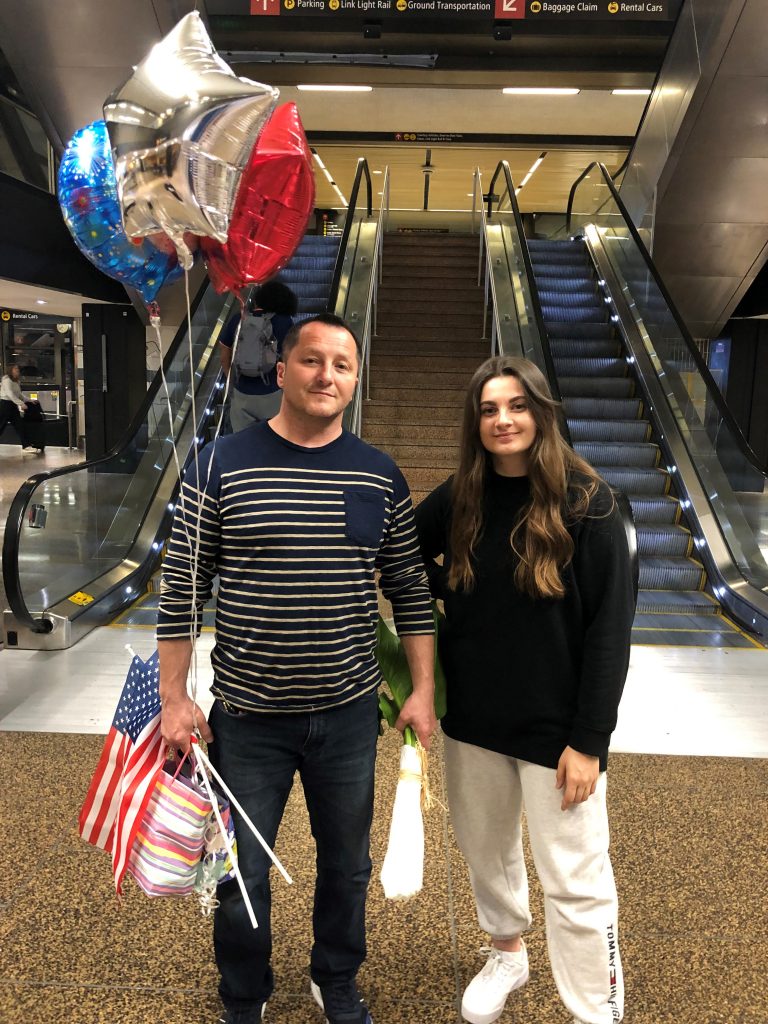
ANA
Ana had just arrived to the U.S. from Ukraine on February 2, 2022 – right before the war broke out. For four years, she had waited for her application to come to the U.S. to be approved, after experiencing persecution for her Pentecostal Christian faith. Now Ana was ready to welcome her sister Luda, her brother-in-law, and her two nieces to their new home.
Ana and her uncle rolled up in their minivan, “Are you Liz?” We transferred the two booster seats, so the 4 and 6-year-old daughters could safely make the final leg of their 40-hour journey. Ana popped out of the car with a smile, two treat bags brimming with candy, a bouquet of Calla Lilies, two U.S. flags, and a bunch of red, white, and blue balloons.
ROMAN
Roman, Ana, and I waited at the bottom of the escalator for the family to arrive, and they recounted some of their stories. Roman had fled Ukraine in 1995 and resettled in the U.S. as a refugee. It pained him to see Ukrainians suffering even after all these years from Russia’s military; “they don’t care if it is soldiers or civilians… they have been raping and killing and bombing…” I could hear the pain and disappointment in his voice as he reflected on the horrors facing those who remained in the country.
His church in the U.S. has gathered together to regularly send money, supplies, and relief to those throughout Ukraine. Tonight, he got to welcome some of his family to safety in the U.S. even as he continues to care for those still in Ukraine.
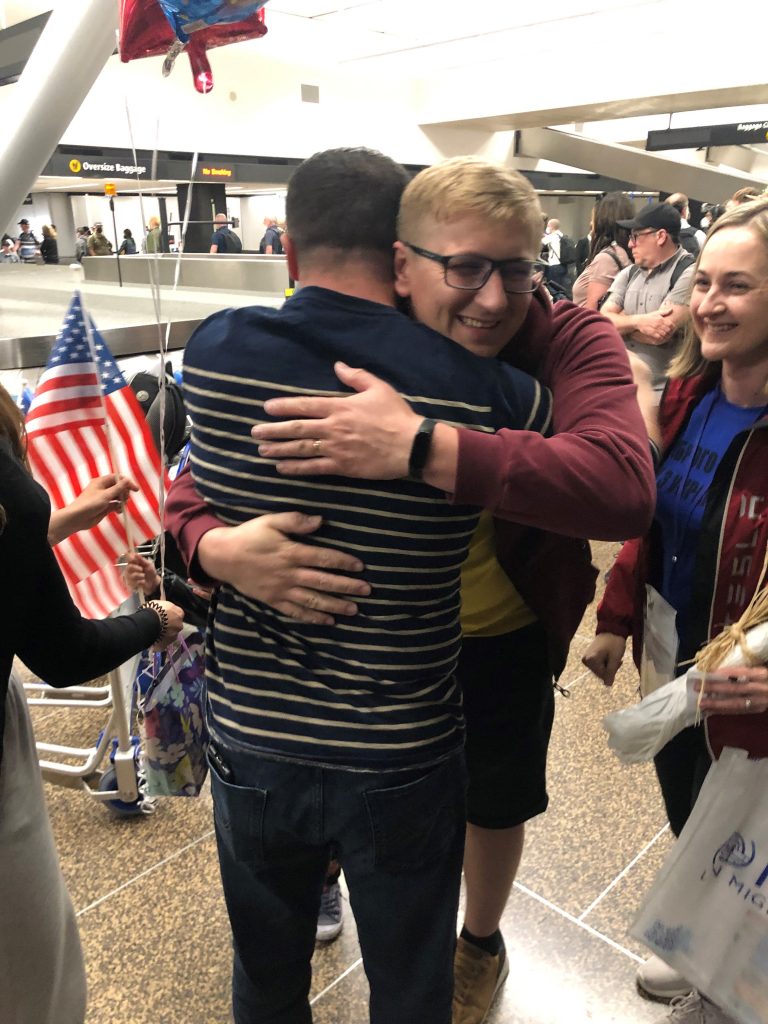
LUDA & FAMILY
Ana was busy texting and making calls, trying to connect with her sister. We got news they bypassed our escalator and made it to baggage claim carousel 5. Ana rushed with the balloons trailing behind her, gently bumping a few passerbys in their wake.
We turned a corner and saw the matching blue and yellow Ukraine shirts Luda and her family had made for their journey. Ana hurried in for a warm hug with her sister. “I can’t believe you are here. Is this really you in the flesh?” she said with a laugh and a few joking probes to confirm her presence. Ana had seen her sister before she had left Ukraine, just about 4 months ago. But 4 months of war had felt like a lifetime – constantly worrying that the bombing would land in her sister’s town.
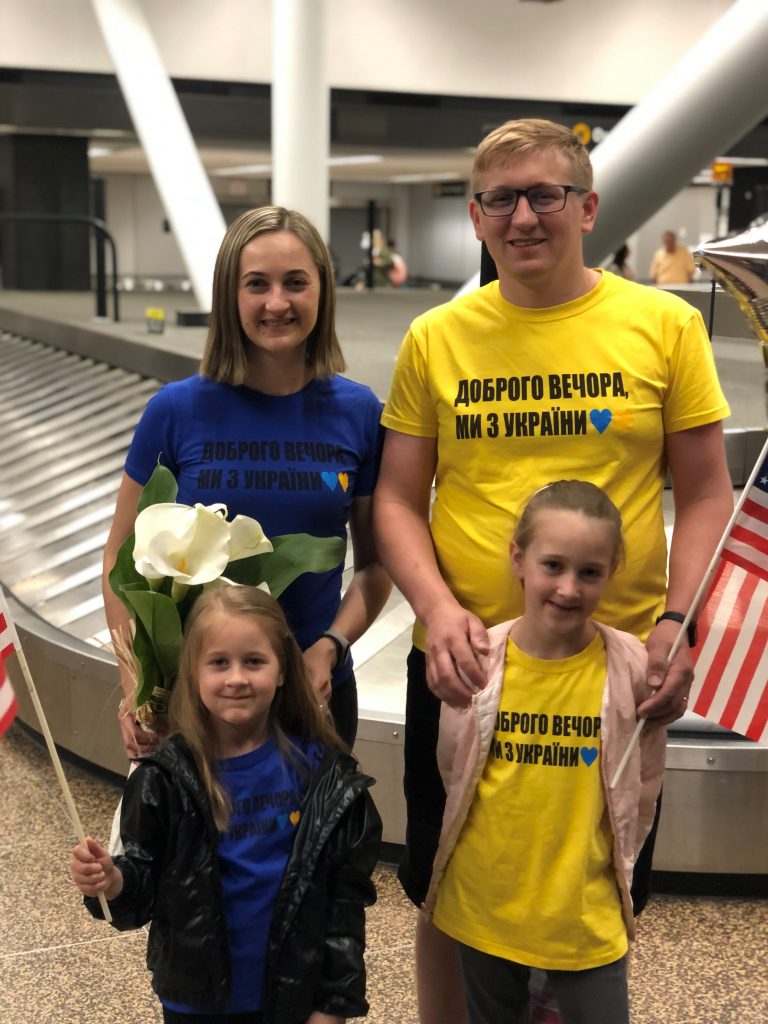
Like Ana, Luda and her family had faced persecution for their faith prior to the war, and had been waiting 4 years to resettle to the U.S. Finally, she was given a travel date in May, but then Russia invaded Ukraine, and the airports throughout the country were bombed and shut down. They didn’t know if they would ever make it.
Luda, her husband, and her two girls fled to Moldova, rescheduled their flights, and finally arrived in Seattle that night of June 9, 2022. The girls embraced their aunt, dug into the candies she shared, and joyously waved the American flags. They shared stories in Ukrainian as we waited for their final bag to pop out on the carousel.
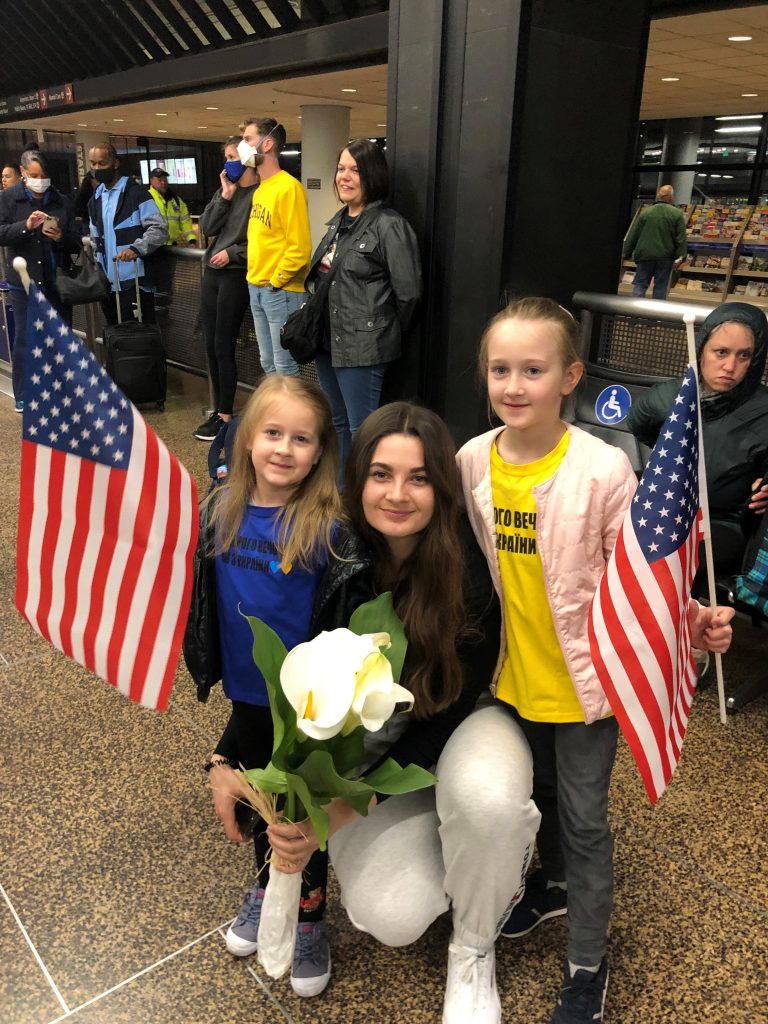
LIZ
For me, I stood by taking it all in, knowing the privilege it was to share this important moment with these families. I was an outsider, but the welcome they gave me into their family in that moment showed me a piece of what reciprocal welcome and hospitality is all about. It wasn’t about me bringing booster seats or saving the day with my theoretical knowledge of the airport.
I received hospitality with the piece of strawberry candy Ana shared with me, “these were my favorite growing up.” It was them asking me multiple times if I wanted to be in the picture as if I was a part of their family. It was Luda starting to go for a hug when I had extended a hand to say “Welcome to the U.S.”
I have a lot to think about this World Refugee Day. Being a community of welcome is giving and it’s receiving. It’s tired hugs after a long journey, sitting in traffic at the airport, and bunches of balloons. It’s the many months and years of building relationships and walking alongside each other as neighbors.
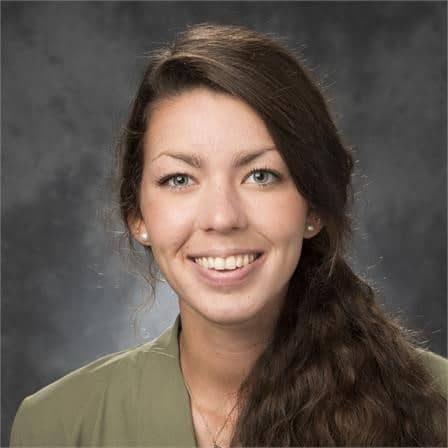
Liz Meyer Hett is World Relief Western Washington’s Communications Coordinator and serves her local offices with unified branding, content creation, and digital marketing. She has passions for organization, design, and connecting people.
20 Ways to Learn More About Refugees
Over the past year, crises in Afghanistan and Ukraine have reminded us of the devastating impacts of war — especially on those forced to flee their homes.
Around the world, a record breaking 100 million people have been forcibly displaced. Of those, 26.6 million are considered refugees, having fled across an international border due to war, violence, conflict or persecution. That’s millions of mothers and fathers, daughters and sons, teachers, doctors and friends — each created in the image of God — with full lives and identities long before they became refugees.
As we enter World Refugee Awareness Month and look toward World Refugee Day on June 20th, we’ve compiled a list of books, podcasts, videos and more to help answer your questions about refugees. As you engage with and share these resources, we hope you’ll be inspired to join us in creating a world where everyone can thrive.
READ
Blog: Drivers of Mass Displacement
For every 95 persons worldwide, 1 has been displaced. People are displaced from their homes for myriad reasons, including persecution, conflict, violence, human rights violations and climate-related factors. World Relief’s Lydia Dawson explains the drivers of mass displacement and how World Relief is responding globally.
Blog: Welcoming the Welcomers: One Afghan’s Journey to the U.S.
David was one of the 53,000 Afghans evacuated out of Kabul in August. He shares his story of escaping Afghanistan with his family, resettling with World Relief North Texas and the long road to rebuilding.
Book: Inalienable: How Marginalized Kingdom Voices Can Help Save the American Church
U.S. churches are at a critical crossroads — blurred lines between discipleship and partisanship have compromised our witness and confused our national and individual responses to refugees and “the stranger.” In a new book, pastor Eric Costanzo, missiologist Daniel Yang and World Relief’s Matthew Soerens find hope in the witness of global Christians, the poor and the ancient church.
Book: Beyond Welcome: Centering Immigrants in Our Christian Response to Immigration
World Relief’s Karen González, invites Christians passionate about serving immigrants to explore how we can create welcoming communities that put our immigrant neighbors at the center of the conversation. Now available for pre-order.
Book: Everything Sad is Untrue: (a true story)
Following his mother’s vocal embrace of Christianity, Daniel Nayeri, his mother and his sister were forced to flee Iran. In this memoir, he retells the tales of his family’s history from his perspective as a misfit middle schooler in Oklahoma.
Book: The Girl Who Smiled Beads
When Clementine was six years old, she and her 15-year-old sister, Clair, fled the massacre that was happening in their home country of Rwanda. In this riveting memoir, Clementine tells their story of rebuilding and reclaiming life on their own terms.
Book: On the Other Side of the Sky
After stepping on a landmine and narrowly escaping death, Farah Ahmedi fled her home country of Afghanistan with her family and resettled in the U.S. Today, Farah is a writer, mother, speaker, humanitarian and activist. She tells her story in this remarkable memoir.
LISTEN
This World Relief mini-series offers a global and a biblical perspective on the subjects of immigration, mass displacement and refugee resettlement, diving into current policies and practices and sharing stories of our collective human experience.
Podcast: Working a Refugee Crisis: Jordan
In 2011, civil war broke out in Syria resulting in the largest refugee crisis since World War II. In this six-episode series, hear conversations from refugees, locals, relief workers and aid agencies who responded to the crisis in Jordan and gain a deeper understanding of the refugee crisis.
This six-part series traces the U.S. refugee resettlement journey through the eyes of those directly experiencing it. Follow along as each episode brings the listener into the daily lives of refugees adjusting to life in the U.S.
Podcast Episode: Learn and Pray Together for Ukraine with Jenny Yang
Crises like the war in Ukraine can feel overwhelming. In this podcast episode, Jamie Ivey talks with World Relief’s Jenny Yang about practical ways Christians can respond through prayer, advocacy and action.
WATCH
TEDxTalk: One Refugee’s Life Experience | Come Nzibarega
Born and raised in Burundi, Come Nzibarega shares his story of escaping torture and civil war. Today, Come works as an Employment Specialist for World Relief. Hear more of his story and hear why Come thinks refugee camps are the richest places in the world.
After 8 years in a Refugee camp, Raphael arrived in the United States and was welcomed by World Relief volunteers. Now, he works on staff with World Relief in North Carolina. In this short video, he shares his resettlement journey.
Video: Who are Refugees and How Do They Arrive in the United States?
From flight and displacement to arrival and integration, this 7-minute animated video tells the true story of a refugee family’s experience in each stage of the refugee resettlement process.
STUDY
World Relief Workshop Course: Navigating Friendships
Navigating friendships with those who are different from us can be rewarding — and challenging! In this self-paced, online course you’ll learn essential skills for building empowering, long-lasting friendships with those who may differ from you in culture, socioeconomic status and religion, and best practices for supporting a friend who lives with trauma. Now through June 30, enroll for 50% off with code WORLDREFUGEEDAY50.
Our culture is flooded with thoughts and opinions on people who leave their homes and immigrate to the U.S. — but what does the Bible have to say about migration? Journey deeper into God’s redemptive story of migration and discover his heart for refugees, immigrants and the displaced in this free, six-week study from our partners at Women of Welcome.
Bible Reading Plan: The I Was a Stranger Challenge
Take the challenge and discover God’s heart for those who have been displaced. Over the course of 40 days, read one Bible passage a day that speaks to God’s love for foreigners and refugees.
FOR THE WHOLE FAMILY
Women of Welcome Family Toolkit
Do you wish you could talk with your kids or teenagers about immigration but aren’t sure how? This toolkit makes it simple and fun to invite your family to engage in positive conversations on hospitality and immigration through scripture reading, discussion questions, coloring pages, prayer journal pages, book recommendations and more.
For parents and teachers struggling to know how to talk about mass displacement with children and teens, the UN Refugee Agency offers teaching materials on refugees, asylum and migration, as well as guidance for teachers working with refugee children in the classroom.
Want to keep learning? Stay informed about refugee resettlement and World Relief’s work to care for those in vulnerable situations around the world by signing up for our monthly email newsletter.

Karen Spencer is World Relief’s U.S. Marketing Partner and serves U.S. offices in the area of identity and messaging. She previously served as Mobilization Director for World Relief in Memphis. She is a connector of people, places, passions and purpose.

Kelly Hill serves as a Content Writer at World Relief. She previously served as Volunteer Services Manager at World Relief Triad in North Carolina before moving to Salt Lake City. With a background in International and Intercultural Communication, she is passionate about the power of story to connect people of diverse experiences.
From Burma to the U.S.
Saw Sar Kapaw*, pictured above with his wife and son, worked as a lawyer and activist in Burma, also known as Myanmar. He sought out justice and had a passion for his daily work. But on February 1, 2021, everything changed. His fight for justice had just begun.
Burma, which sits just west of Thailand in Southeast Asia, has a history of British colonization, military rule, and internal conflict between ethnic armed groups. A democratic government finally emerged in 2015, and was re-elected by a landslide in late 2020. But then in the middle of the night on February 1, 2021 Saw felt uneasy. Something was not right.
At 2 AM the internet went down, and then the phones stopped working. He could not reach his wife, Yee Min who lived in a neighboring state. The next day, the military paraded into the main city and arrested key democratic leaders, making it clear the coup had begun. Saw was trapped with his colleagues, unable to go outside for days.
Seeking Justice
“After those days, the military said ‘you can go back to your hometown and stay freely,’ but we knew that with this condition, nothing is really like that because the people don’t accept the military coup. I had two options – go back to [my hometown]… or go back to Yangon and participate in the underground movement,” shared Saw.
Saw Sar Kapaw knew he had to advocate for democracy and freedom throughout his country, so he went on to the country’s largest city, Yangon, where he participated in the protests and supported those who were leading the movement.
Before long, violence spread wide as the military arrested, attacked, and killed those supporting and leading the pro-democracy movement. It became more and more dangerous to stand against the coup. Saw shared that “many of my friend’s houses were burned by the military.”
Saw fled to Thailand temporarily so he could continue his remote, underground work fighting for his people’s freedom. The U.S. embassy encouraged him to resettle in the U.S. and supported the process. Saw Sar Kapaw’s wife, Yee Min, and their two-year-old son were finally able to join him in Thailand, ready for their journey to the U.S.
Studying English
World Relief welcomed Saw and Yee Min to the U.S. on September 1, 2021 at Sea-Tac Airport. “First, we stayed in Auburn with a host family… they were very kind to us. We learned the American culture – how they eat, how they care for their children, how they spend their time.”
Saw’s family found a place of their own to live and he started a job at a hotel alongside all the hours he spent working online to support the movement in Burma. For the first 6 months, they felt rather isolated in their new lives. But slowly they began to settle in and build community.
One place they started to find community was at World Relief’s English as a Second Language (ESL) classes. Saw and Yee Min meet with other classmates on Zoom twice a week and have self-guided lessons twice a week. “Even our son is taking classes. They have a family literacy class, so he has a chance to meet friends from Afghanistan and Ukraine” shared Saw.
The classes are safe places where refugees and immigrants coming from all ranges of skill levels can learn English. Saw emphasized how his class was practical and helpful for his family’s daily life; “for the beginners like us, Americans speak very fast. So until now, I didn’t understand what they are speaking. In World Relief’s ESL class they speak very slowly; they try to understand us. Sometimes they use body language so we can understand what they are saying”
Saw Kar Kapaw is strengthening his English skills and improving his vocabulary, grammar, and sentence structure, not just for his daily life, but for the pursuit of justice. Saw plans to become certified as a paralegal in the U.S. so he can continue his work in the U.S. advocating for justice and fighting for democracy.
World Relief Rebrands Western Washington Locations
May 2, 2022
CONTACT:
Audrey Garden
audrey.garden@pinkston.co
571-405-1606
KENT, Wash. — World Relief announced this week a rebrand for its office locations in Seattle and Bellingham to World Relief Western Washington (WRWW). With an expansion to Whatcom County last year and the expected addition of a Thurston County location this year, the refugee resettlement and immigrant services agency updated its name to reflect its regional impact.
“This expansion not only provides the opportunity for more communities to welcome new neighbors, but it also gives us the opportunity as World Relief Western Washington to build capacity through our long-standing expertise in resettlement and welcoming families and individuals,” said World Relief Western Washington Executive Director Medard Ngueita.
The new branding includes the launch of a new logo and website: worldrelief.org/western-wa. World Relief Western Washington is holding a virtual town hall on Thursday, May 5, at 7:00 p.m. PDT to share about the vision behind the new name and how services are expanding. Registration for the virtual town hall is accessible via: worldrelief.org/western-wa/events.
As the largest refugee resettlement and immigrant services organization in Western Washington, WRWW has served more than 40,000 refugees, immigrants, and asylees since 1979 and activates and empowers community partners to participate in building a welcoming community for newcomers. By 2023, WRWW plans to serve over 10,000 immigrants and refugees per year through a suite of comprehensive wraparound services.
To download a PDF version of this press release, click here.
About World Relief Western Washington
Since 1979, World Relief Western Washington has worked alongside the community to welcome refugees by following a philosophy of co-empowerment, collaboration and contextualization. Founded in response to the needs of refugees fleeing wars in Southeast Asia, World Relief’s Seattle location grew to support refugees, asylees, asylum seekers and immigrants from all around the world as they rebuild a sense of home in Western Washington. World Relief Western Washington envisions every refugee and immigrant welcomed by community, rooted in community, and empowered for community.
Learn more at worldrelief.org/western-wa.
From DRC to the 253: A blacklisted, exiled journalist hasn’t given up working for a better Congo
At his newfound home in Tacoma, Washington, Antoine Roger Bolamba has watched Chris Cuomo criticize Donald Trump on live TV. Seven years ago, working for Radio-Télévision Nationale Congolaise, the national TV station of the Democratic Republic of the Congo, he could not have dreamed of criticizing his president.
“In my home country, you will not finish your program,” he said. “You will see military people; police will come.”
Bolamba narrowly avoided this very fate. Achieving his lifelong dream, he held the spotlight as a primetime anchor for Congo’s national TV station. But when the country’s lack of journalistic freedom became a personal reality, he was confronted by a terrible choice.
A Crisis of Press Freedom
Covering the vast, resource-rich Congo River Basin, Congo is the second largest country in Africa. Several local kingdoms dominated the area before Belgian colonization during the 19th and 20th centuries. Despite gaining independence in 1960, the nation has been plagued by constant internal and external conflicts and subsequent humanitarian crises.
Bolamba was born in Kinshasa, Congo’s capital, and raised by Catholic charismatic parents. When he was still young, Bolamba knew he wanted to become either a priest or a journalist. He wanted to serve God and inform people.
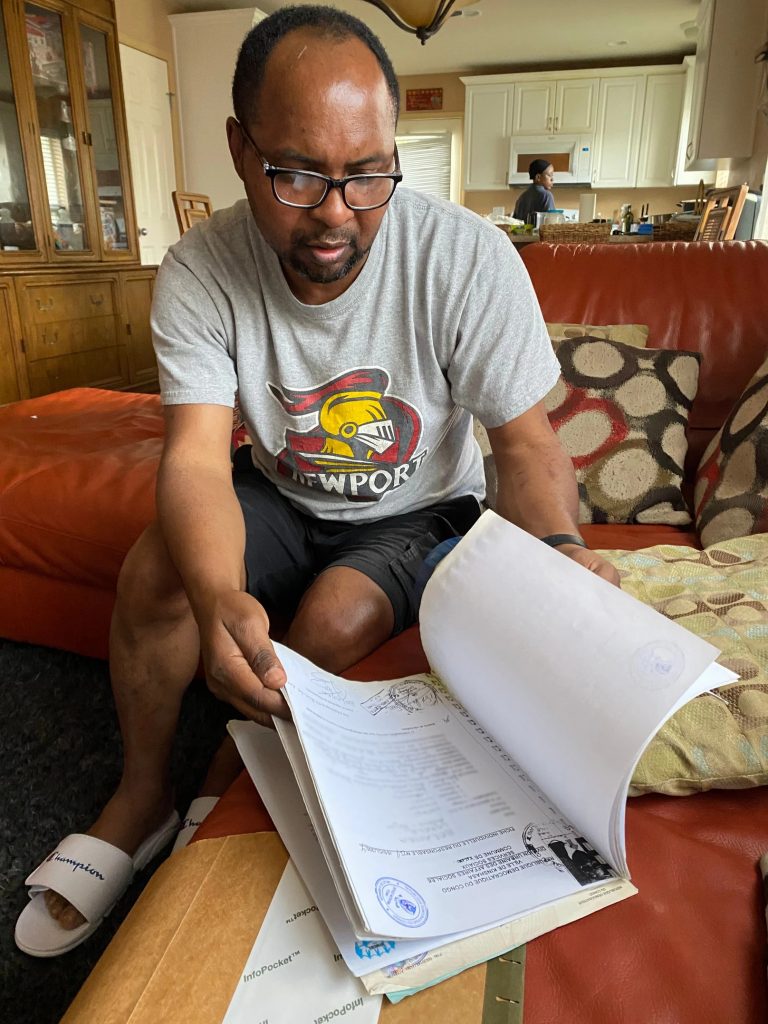
from an educational nonprofit he started in Congo. (Photo/Daniel Hart)
He interned for a private TV broadcaster while studying journalism at the Catholic University of Congo. In 2010, Bolamba started working for the national TV station. Within six months, he was presenting the 8 p.m. news for the country’s largest TV audience.
He didn’t stop there. In 2012, he was hired as a press attaché for the country’s Planning Ministry. His work took him around the world. In 2013, he created a video on investment opportunities in Congo and presented it alongside the Planning Minister at the U.S.-Africa Business Summit in Chicago. In 2014, he traveled to Mexico City to argue to the Extractive Industries Transparency Initiative that Congo’s mining industry was making meaningful progress toward benefiting the country’s citizens. That same year, he covered a summit in Belgium for the international Congolese diaspora.
For all his success, he was very aware that all was not well for journalists in Congo.
Reporters Without Borders, an international nonprofit that advocates for press freedom, ranked Congo 149 out of 180 in its 2021 World Press Freedom Index. Also this year, Freedom House, a U.S. government-funded research institute, gave Congo a 20 out of 100 ‘not free’ score for political rights and civil liberties.
Bolamba described journalism in Congo as neither free nor independent. Known locally as coupage, payment from sources is an everyday occurrence and practically journalists’ only form of income.
“You are depending on the politician or on people who need you to pass their message,” Bolamba said. “So because you get paid from there, you cannot be objective.”
In addition to the lack of financial independence, Bolamba said he and other journalists were watched closely by government officials as they presented the news, especially when they spoke about the government. He knows many colleagues who have been imprisoned as a result of their work. Others have died under mysterious circumstances. Bolamba learned to be careful what he ate or drank, especially with politicians. In taxis, he always sat beside the door, not between other passengers. He took care to protect his reputation from defamation, avoiding the appearance of anything that might be professionally unacceptable.
In 2012, the country’s information minister accused another politician of having sex with a minor, and Bolamba investigated. Although the politician was jailed, Bolamba’s coverage cast the allegations into doubt. He doesn’t know for sure, but he suspects that his work on this story may have led to what came next.
The Crash
One day in 2013, the TV station’s human resources director quietly showed Bolamba a letter that the director of the station had sent to several government officials. The HR director wouldn’t give Bolamba a copy, fearing for his own safety. The letter stated that Bolamba was working against the ligne editorial, the editorial policy the government expected to hear on national TV. It claimed that Bolamba was giving too much airtime to the opposition. The HR director warned that Bolamba’s director was trying to destroy his reputation and that he was in danger of being imprisoned or killed.
As Bolamba read the letter, he was shocked and bewildered. By the time he left the office, he knew he could not stay in Congo.
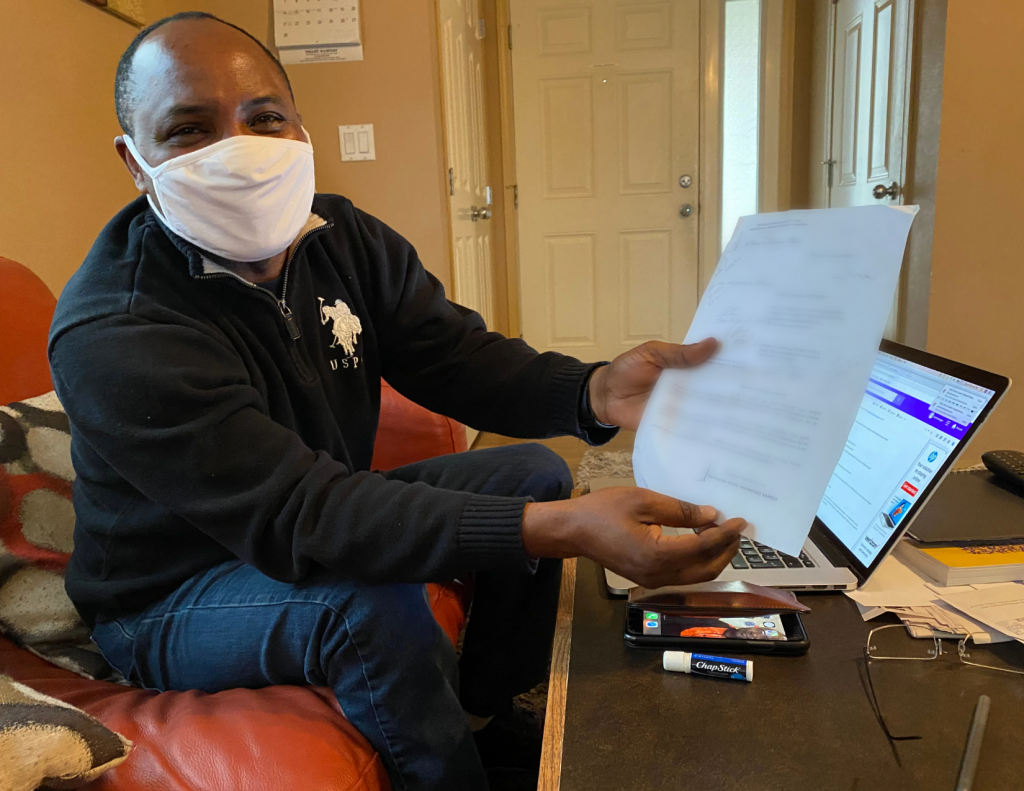
Eventually, an auditor who Bolamba knew was able to surreptitiously secure a copy of the letter for him. He asked friends and colleagues for help and advice. Over and over, they told him the same thing: your life is in danger; you have to leave. Fortunately, Bolamba had a U.S. visa from his previous work trips. However, his sons and Claudia, his wife, did not. She implored him not to leave.
“‘It looks like something bad is coming, so I need to leave,’” Bolamba recalled telling her. “She insists, ‘Don’t do that! I have kids.’”
As Bolamba remembered agonizing over the possibility of leaving his wife and four sons behind, he stopped, unable to continue for several minutes. He silently wiped away tears triggered by the memory of that separation.
Slowly, in a low, constricted voice, he began his story again, recounting how Claudia left with the children for another part of the country, far from Kinshasa.
“In normal time, I could not accept that my spouse and kids live there,” he said. “No water, no electricity. So no car. No good school.” He said the decision still haunts him.
On March 1, 2015, compelled by the real possibility of arrest or murder, Bolamba left the country.
“I arrived here in Seattle with nothing,” he said. “So I restarted a new life from the crash.”
He stayed with various friends for weeks or months at a time. He sent documentation of his experience, including the letter that had blacklisted him, to U.S. Citizenship and Immigration Services. They sent him a work authorization card to use while his case was considered. Over the next few years, Bolamba took jobs as a security guard, a recycling sorter and a Lyft driver.
In 2018, he received the news he had been hoping for: he had been granted asylum. He received his Green Card, confirming his status as a permanent U.S. resident. Then, he went to World Relief, looking for help to bring his family from Congo. World Relief’s Immigration Legal Services team provided a cheaper option for help with submitting the needed forms. That year, Bolamba’s wife and sons were able to join him in Seattle. Bolamba thanked God for reunifying his family.
At the same time, Bolamba said he continues to grieve what he lost. Since arriving, he has worked to survive, not to pursue journalism. He wonders if he will never do his dream job again.
“I was thinking about that today again,” he said. “If I didn’t take that decision to be proactive, I don’t know what should happen. I don’t know. But I took this action. Today I can live with my spouse and my kids – far away from my business, my job, my family, my friends.”
Start Somewhere
In spite of his exile, Bolamba remains committed to the journalistic ideal. While he currently works as a caregiver, he is eager to return to reporting. In March, he received certification as a public relations consultant and completed online courses in human rights and diplomatic protocol. He is a member of the Seattle Association of Black Journalists.
Looking to the future, he is working to build a public relations channel called Pano 5 as well as a geopolitical podcast focused on Congolese politics, poverty and natural resources. He has plans for a nonprofit, African School of Family Wellbeing, that would work to improve life for Congolese families.
“I don’t like to count on people anymore,” he said. “I prefer to count on God and listen to myself, what God is telling me to do, go where God is telling me to go.”
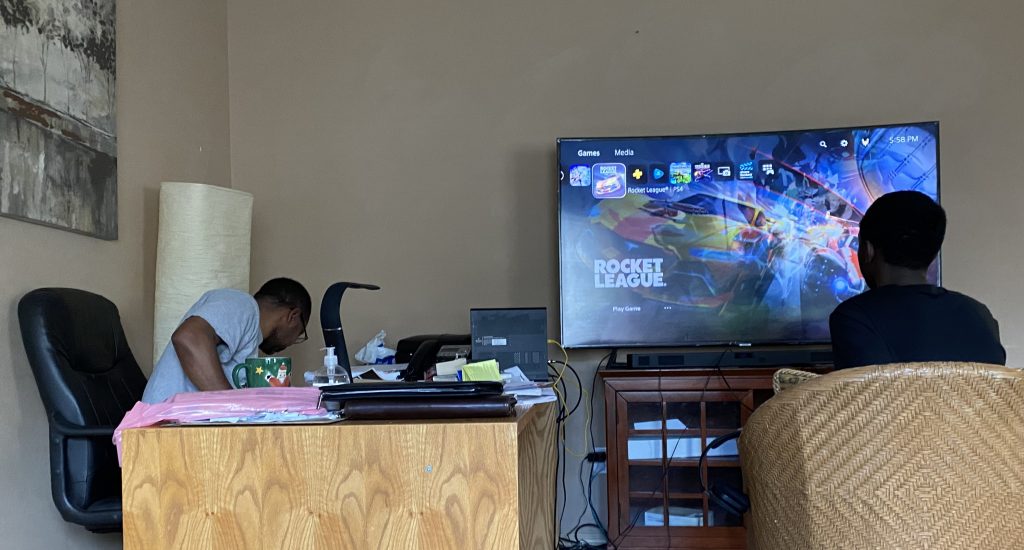
He said his accent and lack of vocabulary pose significant challenges.
“I need to start somewhere because it’s kind of a passion for me. But a passion that broke,” he said.
The threat of violence, a harrowing separation from his family and the struggle to rebuild a life far from home shattered Bolamba’s dream. Yet here on the other side of the world, he is reassembling his vision piece by piece. Bolamba is doing all he can to break the pattern of violence and political repression that has plagued his homeland for decades. He said he hopes to see a president legitimately elected through the democratic process.
“My hope is that one day, the Congo will be living in peace, everywhere in the country,” he said.
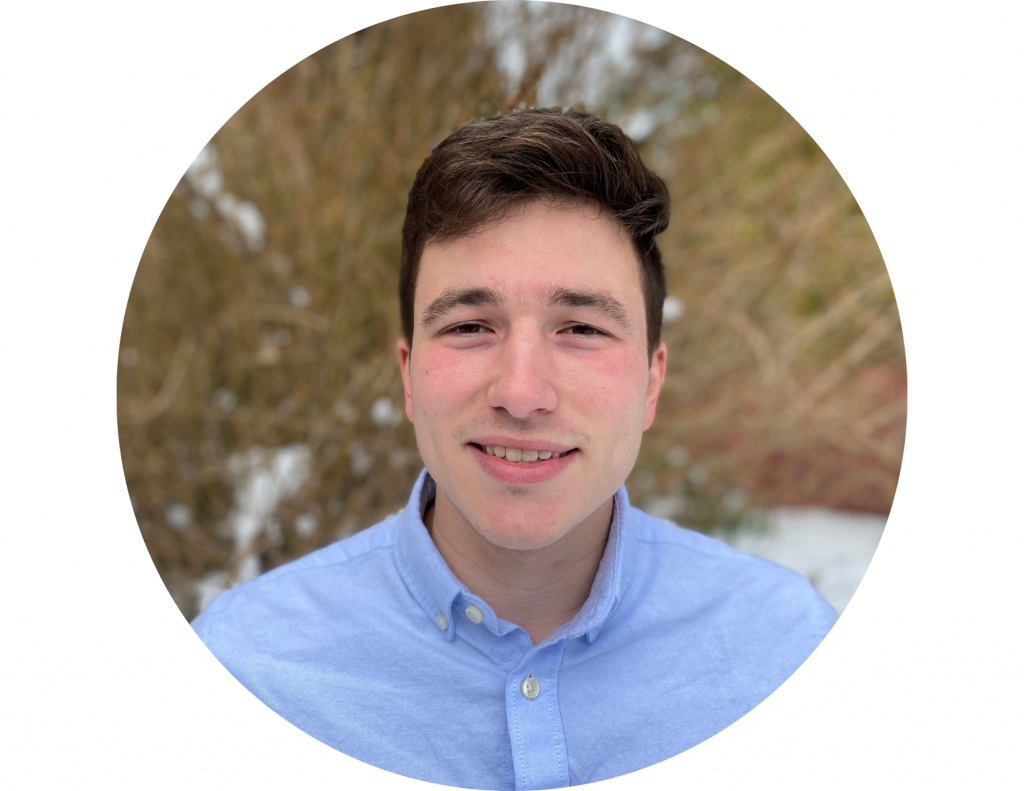
Daniel Hart is a Seattle-based journalist who writes about politics, immigration, and religion. In 2020, he completed a refugee resettlement internship with World Relief Seattle.
World Relief Welcomes Announcement of Ukrainian Refugee Resettlement and Humanitarian Assistance, Urges Broader Welcome
March 24, 2022
CONTACT:
Audrey Garden
audrey.garden@pinkston.co
571-405-1606
BALTIMORE – Today, President Biden announced a plan to admit as many as 100,000 Ukrainians to the United States as refugees and through other means. In addition, the United States is committing to provide more than $1 billion in new funding towards humanitarian assistance for those affected by Russia’s war in Ukraine and its impacts around the world. World Relief welcomes this announcement of additional humanitarian aid and is eager to welcome more Ukrainians to the United States, while also insisting that the U.S. should also welcome a larger number of refugees fleeing other conflicts globally.
“Prior to the Russian invasion last month, World Relief had already resettled more than 7,300 Ukrainians in the past decade, roughly 40 percent of all Ukrainians admitted to the U.S. as refugees during that time,” observed Myal Greene, president and CEO of World Relief. “We are in close contact with many of these individuals, almost all of whom have loved ones now at risk in Ukraine, and we’re grateful that President Biden’s announcement today seems to open up the likelihood of expedited family reunification and other avenues of protection. We are ready to welcome them, in partnership with local churches and other community partners.”
World Relief is also actively responding to the crisis in Europe, working with local churches and other partners both in Western Ukraine and in Slovakia, Romania, Moldova, Poland, and Hungary to provide immediate humanitarian assistance to Ukrainians who were forced to flee to neighboring countries or are in need of immediate assistance in Ukraine.
“The additional funding provided by the United States will help meet the immediate humanitarian needs of vulnerable Ukrainians who are bearing the brunt of war. We urge the international community to continue to provide humanitarian assistance as generously as possible to vulnerable Ukrainians and ensure there can be humanitarian corridors for civilians to be able to safely leave Ukraine or for aid to reach those trapped inside Ukraine,” said Myal Greene. “Most Ukrainians who make the difficult decision to leave their homes are relatively safe in neighboring European countries, where most would prefer to stay, in part because they hope and pray to return soon to a safe, free Ukraine. But for those who have family in the U.S. or for whom voluntary repatriation is impossible, some may prefer the option of resettlement to the U.S., where we are also eager to welcome and support them as they replant their lives. A multi-pronged approach to this crisis, exploring every pathway of protection for those who can resettle to the United States, while also continuing to support Ukrainians who remain in the region, will be critical as the humanitarian needs climb in the months ahead.”
While pleased with the U.S. government’s intention to welcome a large number of Ukrainian refugees, World Relief is also concerned about refugees who have fled other conflicts. “The Russian invasion of Ukraine is just the latest in a series of wars and conflicts that have fueled the greatest global refugee crisis since at least World War II,” noted Jenny Yang, senior vice president of advocacy and policy for World Relief. “The Biden administration must rebuild the U.S. refugee resettlement program not only for Ukrainians, but also for those who have fled similar conflicts that have garnered less media attention or been largely forgotten in the U.S. — even though the conflicts continue and refugees remain in desperate conditions in neighboring countries for years and sometimes for decades.”
World Relief celebrated the president’s decision last fall to raise the annual ceiling for refugee admissions to 125,000, the highest level in decades. But it has become clear that, without dramatic U.S. government efforts to increase the pace and scale of overseas processing as well as sustained investments in the domestic resettlement infrastructure, the U.S. will resettle, at most, a small fraction of that goal this year. Five months into the federal fiscal year, the U.S. has admitted just 6,494 refugees, which does not include Afghans resettled through a separate process.
“We need to rebuild a robust, nimble resettlement process that can welcome the persecuted from various parts of the world, with a particular concern for those most vulnerable, who may have no safe neighboring country to which to flee. And we must also ensure our asylum laws offer protections to those of any nationality who reach the U.S. and can demonstrate a credible fear of persecution, rights that the Biden administration is currently denying to many who are not Ukrainian under the pretext of the COVID-19 pandemic,” said Yang.
As the president travels to Europe, World Relief urges the president to encourage and support Poland and neighboring countries to continue their welcome of Ukrainian and other refugees. World Relief also urges the international community to stand in solidarity with the Ukrainian people by providing ongoing humanitarian assistance and facilitating diplomatic solutions to resolve the conflict.
“We hope and pray that the Ukrainian people will know peace and security in the near future. And we call upon the global church to support the Ukrainian people, and others experiencing conflict, as robustly as possible,” said Myal Greene.
Individuals interested in supporting World Relief’s humanitarian response in and around Ukraine can find more information at worldrelief.org/respond, while those interested in supporting resettlement efforts within the U.S. can find a list of World Relief resettlement locations at worldrelief.org/us-locations.
To download a PDF version of this press release, click here.
About World Relief
World Relief is a global Christian humanitarian organization that brings sustainable solutions to the world’s greatest problems — disasters, extreme poverty, violence, oppression, and mass displacement. For over 75 years, we’ve partnered with churches and community leaders in the U.S. and abroad to bring hope, healing and transformation to the most vulnerable. Learn more at worldrelief.org.










